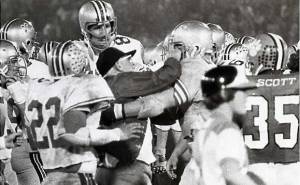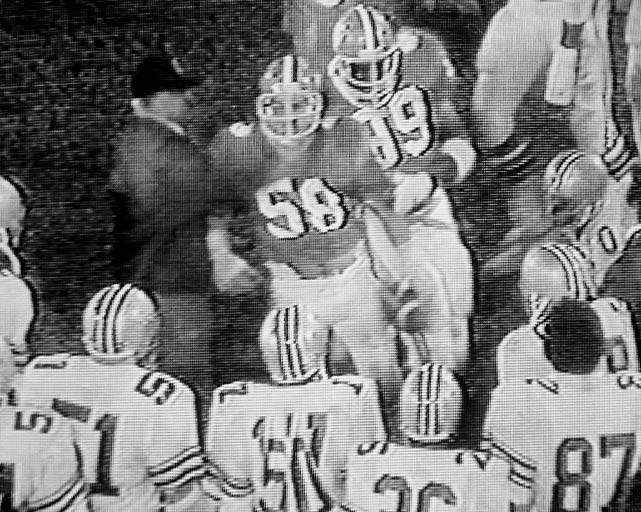Credibility is a precious thing. Building it generally takes a long time, but it can be destroyed in a flash. Speaking only for myself, this applies to the late Keith Jackson. Enormously popular as a TV announcer for college and pro football, basketball, baseball, the Summer and Winter Olympics, and auto racing, he had an egregious lapse of judgment when calling the 1978 Gator Bowl between Ohio State and Clemson. I was watching the game and have reviewed clips of it on Youtube many a time. I did not then and do not now understand how he and color commentator Ara Parseghian could have failed to see that Buckeyes coach Woody Hayes slugged Charlie Bauman near the end of the game. Let me walk you through it.
The Tigers led, 17-15, with two minutes to go. But OSU was driving and almost within field-goal range. Hayes evidently wanted a few more yards (and to eat up more clock) before sending in his kicker. Three points, Ohio State wins and hip-hip-hooray for the scarlet and gray. But that did not happen. Quarterback Art Schlichter took the snap, avoided a tackler and threw in the direction of Ron Springs but the ball went straight to Bauman, Clemson’s nose guard. He grabbed it cleanly and lumbered about 10 yards down the left sideline where Schlichter hogtied him and rode him out of bounds. This, it should be noted, was the Ohio State sideline. The ’78 Gator Bowl would be long forgotten if not for what soon transpired there. Bauman was surrounded by a lot of unhappy Buckeyes when he sprang up, the ball in his left hand, and looked straight at them. He may have roared and said some impertinent words. In the event, he need not have worried about any guys in uniform but their coach. Hayes, well known as a hothead, grabbed Bauman’s jersey and slugged him in the throat with his right fist. Of course, a melee ensued as Bauman’s teammates hurried to his defense. Before it was all over, Hayes had punched one of his own players—offensive lineman Ken Fritz—who was trying to calm him down and ameliorate the damage.
Old-school coach

I saw what happened, as did countless others. The coach who had led OSU to national championships in 1957 and 1968 had attacked an opposing player. But Jackson and Parseghian feigned ignorance. Jackson: “I don’t know what it was that triggered the fight.” Parseghian: “I don’t know what triggered the action here on the sideline.” Jackson again: “I can’t tell there…. I can’t see what would have triggered it.” The cameraman sure knew because he kept the focus on Hayes, who received a 15-yard unsportsmanlike conduct penalty, rudely grabbed a ref and got another 15 yards. There was a replay of the incident, and still Jackson and Parseghian acted mystified. For the remainder of the telecast, they played dumb.
There can be no doubt, none whatsoever, that Jackson was covering for Hayes. Both were long-timers in the college football world, and Jackson must have feared some kind of unpleasantness if he spoke the obvious truth: Hayes punched Bauman. Parseghian (who, as Notre Dame’s coach 12 years earlier, had played it very safe by running out the clock in a titanic 10-10 tie with Michigan State) shares the blame. As is well known, Hayes was fired the next day. The extent to which he ruined his long and illustrious career is debatable. Let’s just say it was badly stained. Forty years have passed (Hayes died in 1987), and Bauman has hardly said a word about the matter. Jackson stayed active for another two-plus decades, concluding with the 2005 national championship game between Texas and Southern California in the Rose Bowl.
Like many others, I enjoyed Jackson’s folksy language and relaxed manner on camera and with the microphone. A Georgia native who majored in speech communication at Washington State, he was very good at his craft. But that night in Jacksonville, his reputation—IMHO—suffered almost as much as that of Woody Hayes. After his death at age 89 in January 2018, the encomiums were plentiful. ESPN and Sports Illustrated praised Jackson up one side and down the other but managed not to say a word about his Gator Bowl faux pas.
The gambler
Let me finish with a note about Art Schlichter, the Ohio State QB who threw the interception that led to Bauman getting whacked by Hayes. A freshman in 1978, he was a four-year starter for the Buckeyes. By all accounts a superb athlete, he was also deeply troubled. More than sports, Schlichter loved gambling. Even while in high school, he spent an inordinate amount of time at Scioto Downs, a harness-racing track near Columbus. That continued throughout his OSU career and later as he wagered thousands of dollars on college and pro sports. Schlichter’s descent into gambling, drugs and involvement with bookmakers and other underworld figures is all too well known. The Baltimore Colts’ first-round pick in 1982, he was a complete bust and soon washed out of the NFL. A con man’s con man, he was found guilty numerous times of wire fraud, bank fraud, forgery, possession of cocaine and stealing from friends and family, and has called more than 30 jails and prisons home. He is currently an inmate at Williamsburg Federal Correctional Institution in Salters, South Carolina; doctors say Schlichter has chronic traumatic encephalopathy from all the hits he took in football. I am speculating here, but it’s quite possible that his wayward pass near the end of the 1978 Gator Bowl was no accident.


1 Comment
Indeed Jackson blew it. Much of his career was spent being a lackey for NCAA athletics and one wonders if his first thought (after Hayes’ fisticuffs) was, “How do I make this look good?” The great announcers called ’em as they saw ’em. Scully, Caray, Ray Scott, and others told you exactly what occurred on the field. I doubt that any of them ever fretted over reporting poor sportsmanship by a coach or player.
Add Comment